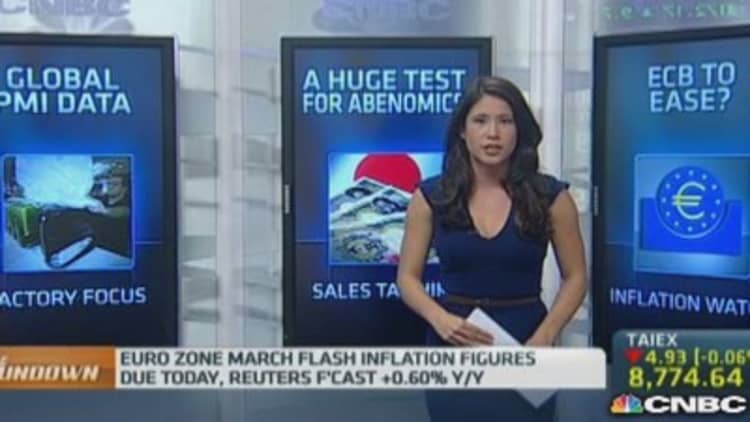
There's plenty to chew over in Asia this week including monetary policy decisions in Australia and India, a key gauge of Chinese factory activity and a hike in Japan's sales tax.
Both the Reserve Bank of Australia (RBA) and Reserve Bank of India (RBI) are expected to leave interest rates unchanged at meetings on Tuesday, but analysts say interest rate hikes are likely in the months ahead.
A series of positive economic reports from Australia this month - from stronger than expected GDP [gross domestic product] data to rising inflation and household spending - have fueled talk of a rate increase from the RBA sooner rather than later.
Read MoreAustralia economy picks up speed in fourth quarter
HSBC notes that a decade-high unemployment rate remains a key factor in the way of an immediate rate hike.
"For now, we expect the RBA to maintain a neutral stance but if the labor market improves in coming months, as we think it will by mid-year, we expect this stance to shift to a mild tightening bias," said Paul Bloxham, chief economist, Australia and New Zealand, at HSBC in a note.
In India, easing wholesale and consumer inflation and disappointing fourth-quarter GDP numbers could encourage the RBI to hold back from pulling the rate-hike trigger for now. Governor Ragurahm Rajan has lifted interest rates three times since taking over in September to contain inflation.
Markets should brace for a resumption of policy tightening within the next six to nine months, said Mizuho Bank.
Read MoreWorld's biggest election: Game changer for India?
"Sticky underlying price pressures and a latent rebound in inflation means that the RBI is not discarding its hawkish inclinations just yet," said Vishnu Varathan, senior economist at Mizuho.
China PMI time
Tuesday also sees the release of China's official manufacturing price index (PMI) and HSBC's final reading for March. Last week, the bank's preliminary reading fell to an eight-month low of 48.1 and the consensus call from analysts is for the official figure to be just modestly higher.
"The official PMI is expected to follow the HSBC flash PMI lower, but only fall to around 50 (from February's 50.2) given its focus on larger manufacturers and that the later timing of this survey means that it may have seen more of a pick-up in industrial production following the Chinese new year break," said Shane Oliver, head of investment strategy and chief economist at AMP Capital.
Read MoreChina seizes $14.5 billion assets from ex-leader
Japan is also in focus as a widely-anticipated consumption tax increase takes effect on Tuesday. The sales tax is set to rise to 8 percent from 5 percent.
Consumers have ramped up spending ahead of the hike and that's expected to boost economic growth short-term, although the economy is expected to take a hit later this year as consumption slows.
Elsewhere, Indonesian trade and inflation data are due out on Tuesday and Australian February retail sales data are slated for Thursday.

